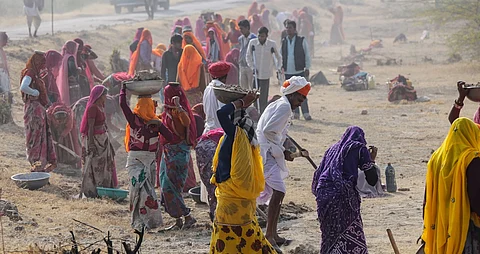

The Union government owes a total of Rs 39 crore as compensation payable to workers under the Mahatma Gandhi National Rural Employment Guarantee Act (MGNREGA), an analysis has found.
The findings, published in The Indian Journal of Labour Economics, was conducted by a group of researchers who analysed a total of 31.36 million MGNREGA wage transactions sampled from 327 blocks across 10 Indian states from the financial year (FY) 2021-22.
The researchers used large-scale empirical exercise, complemented with field work and responses under the Right to Information (RTI) from the government. The aim of the study was to demonstrate how two major digital interventions in MGNREGA — ‘Aadhaar-Based Payment Systems (ABPS)’ and ‘trifurcation of wage payments by caste’, have compromised on public values and increased the design-actuality gap.
Contrary to the claims of the government to introduce ABPS to increase efficiency in wage payments, the digital intervention has caused delay, the researchers found. Only 43 per cent of MGNREGA workers were eligible for ABPS payments during implementation from January 1, 2024, when it was made mandatory.
“Assuming this trend holds true for all the transactions of the states in our study, just the unaccounted delay compensation caused solely by the union government is around Rs 400 crore,” the researchers wrote.
The flagship programme of the central government guarantees 100 days of rural employment annually at a minimum wage. The provisions in the legislation include unemployment allowance of the work demanded by the worker, if work is not allotted within 15 days of application.
It also gives the worker the right to receive wages within 15 days after completion of the work and seek compensation — 0.05 per cent per day of wages for each day’s delayed wage.
The Act mandates the Union Ministry of Rural Development (MoRD) to process and disburse the wages into the bank accounts of the workers within 15 days.
Analysis of nine million MGNREGA transactions for financial year FY 2016-17 showed that only 21 per cent of the wage payments were completed within 15 days. The Union Ministry of Finance, in an internal memorandum, attributed the delay to insufficient funds.
The study stated, “Analysis of 17 million transactions from the first half of FY 2021-22 showed that only 29 per cent of transactions had been processed within the stipulated 7 day period by the union government. And, contrary to the claims made by the MoRD, adequate funds are not released throughout the financial year as per the demand for MGNREGA work.”
The findings revealed that funds dried up around September despite additional fund allotment in the third quarter which further saw exhaustion of funds by February-March.
One-fifth of each year’s allocation in the last five years have been spent in clearing pending liabilities of previous years. Therefore, in line with earlier research, our current findings also suggest that delays in wage payments are an artefact of inadequate funds and not technology designs, the study noted.
The researchers raised concerns that lack of adequate budget leads to violation of workers’ rights for timely wages, and suppresses work demand.
The study demonstrates that to meet the full extent of existing work demand with conservative estimates, the budget allocation should increase at least four times.
“This is in line with the demands of various academics and citizen action groups that the MGNREGA budget should at least be 1.2 per cent to 1.5 per cent of the gross domestic product (GDP). However, the budget allocation in FY 2021-22 was merely 0.41 per cent of the GDP which declined further to 0.2 per cent of the GDP in FY 2023-24 and in FY 2024-25. Even during the pandemic year of 2020-21, it was only 0.56% of the GDP,” the researchers highlighted.
The second technological intervention analysed by the authors is the MoRD modifying wage payments by segregating it as per caste category of workers in 2021.
The MGNREGA recognises three caste categories of SC, ST and ‘Other’. Marginal differences were found in the release of payments by the researchers.
“While only 33 per cent of the payments for ‘Other’ caste category were processed within the mandated seven-day period, the corresponding figures for STs and SCs are 42 per cent and 47 per cent, respectively. Even if we consider a 15-day threshold, only 52 per cent payments were processed for the ‘Other’ caste category compared to 63 per cent for STs and 74 per cent for SCs,” the study said.
Against the claims of the government, the study highlighted that 6 per cent of account-based payments were processed within seven days, compared to 39 per cent of ABPS payments.
It noted, “Although the caste-based segregation of wage payments has been withdrawn, the union government has not assumed any accountability for damages caused by the move.”
The authors argue that introduction of ABPS has led to more opacity without any gains in improving timely payments. “The state’s persistence in creating a positive narrative around Aadhaar is an example of digitalwashing,” they said.